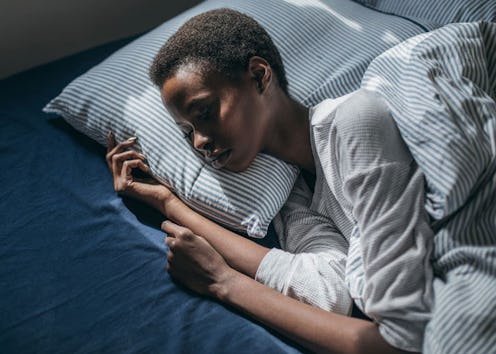Life
These Easy To Miss Behaviours Could Actually Be Symptoms Of A Sleep Disorder

Insufficient or disrupted sleep can be a profoundly isolating experience. All around you, it seems, the bright-eyed and well-rested go merrily about their days, while you're calculating exactly how many double espressos you can neck throughout your shift before you pass out. Sound familiar? You could very well have a sleep disorder. But how can you tell? Parasomnia. I know, I hadn't heard of that term before today either. So what is parasomnia?
The National Sleep Foundation defines parasomnia as "all the abnormal things that can happen to people while they sleep", excluding sleep apnoea. "Parasomnias cover quite a range of events, and some people might not realise they’re experiencing a parasomnia," sleep expert Dr. Neil Stanley of the Sleep Consultancy tells me. The most common parasomnias, he explains, are sleepwalking and sleep talking, and most can be resolved by tackling stress or anxiety, or limiting alcohol consumption. Parasomnias are "perfectly normal and natural," Dr. Stanley stresses, but if recurring, they have the potential to disrupt sleep.
"If you're doing something every once in a while — say every time you have a beer, you experience a parasomnia, then it's probably the beer, so stop it. It's that obvious for some people," Dr. Stanley explains, adding, "but if you’re doing these things on a day-to-day basis, the best thing to do is see a GP."
Wondering if you're dealing with a parasomnia? Read on to discover some of the most common examples, which could indicate a sleep disorder.
1Sleepwalking
Sleepwalking is a sleep disorder called somnambulism. "In adults is relatively rare," Dr. Stanley tells me. "Maybe 4-5 percent of people do it on a regular basis." However, when it does happen, it can be quite dangerous and scare the people you live with. Sleepwalking usually occurs after just a couple of hours of sleep, and results in people sitting up in bed, standing and even walking around, all while completely zonked out. For sleepwalkers, the main priority should be ensuring your living environment is safe so that you don't injure yourself. If it's a regular occurrence, speak to your GP about how to manage it.
2Night Terrors
Night terrors are not the same thing as nightmares. Night terrors are a sleep disorder that cause you to cry and experience intense fear while sleeping. Afterwards, it can be difficult to wake up properly, according to WebMD. Although they are more common among children, adults can also experience them. If you're experiencing night terrors frequently, or are struggling to get enough sleep as a result, make an appointment to see your GP.
3Grinding Your Teeth
Grinding your teeth at night is a condition called sleep bruxism, which, according to the Mayo Clinic, is a "sleep-related movement disorder". The NHS explains that grinding your teeth at night is "most often caused by stress or anxiety", though it can also be related to other sleep disorders including sleep paralysis and sleep apnoea. Bruxism can also occur as a side effect of medication. The usual sleep disturbance suspects — alcohol, caffeine, recreational drugs, and smoking — can also contribute. Grinding your teeth can not only damage your teeth, but can also result in jaw pain, headaches, and earaches, so it's worth speaking to your GP or dentist; they might suggest practising sleep hygiene, wearing a mouthguard, or undergoing cognitive behavioural therapy (CBT) in order to treat anxiety.
4Waking Up Confused
Few of us are at our sharpest right after the alarm goes, but if you're overly confused, your speech is slowed, or you don't know what's going on, you could be experiencing a sleep disorder called "confusional arousals". The American Academy of Sleep Medicine states on its website: "When a confusional arousal occurs, you may seem to be awake even though you have a foggy state of mind. Episodes often start when someone else has to physically wake you up. Sleepwalking or shouting during an episode is common." In rarer cases, people can become hostile when woken up, regularly arrive late, perform badly at work, and even become involved in driving accidents. Worried? Chat to a doctor to figure out potential triggers and/or solutions.
5Talking In Your Sleep
Here's an interesting tidbit: according to Dr Stanley, "probably everyone" talks in their sleep at times, though there's not always someone there — or awake — to hear it. This is actually a sleep disorder known as somniloquy or simple, sleep talking. Reassuringly, it's not problematic in itself, or likely to be indicative of any deeper problem, but if it's disturbing you or your partner's sleep, chat to your GP to determine what steps to take next.
6Acting Out Your Dreams
For some, nightmares or similarly vivid dreams don't stop in the brain: instead, they act out their dreams. This is known as REM sleep behavior disorder (RBD), according to the National Sleep Foundation. If you find yourself flailing your arms and legs while asleep — or if your partner informs you in the morning that you kicked them in the shins again last night — try speaking to a doctor to figure out how to alleviate the symptoms, especially if it's occurring regularly and disrupting your sleep.
7Feeling Tired During The Day
Yes, this is a sleep disorder too, known as hypersomnia or excessive sleepiness. For those with hypersomnia, it's irrelevant how much sleep you get: you'll still be exhausted the next day. If your sleepiness is so problematic that it affects your day-to-day life — maybe you're constantly forgetting things, or falling asleep at your desk — it could be time to see the GP.
8
If you suspect you're experiencing a parasomnia, do your best not to panic. Dr. Neil Stanley emphasises that most parasomnias, while "potentially frightening" are "not medically injurious to health". A chat with your GP should help to put your mind at ease — and deliver some insight into getting a better night's sleep.